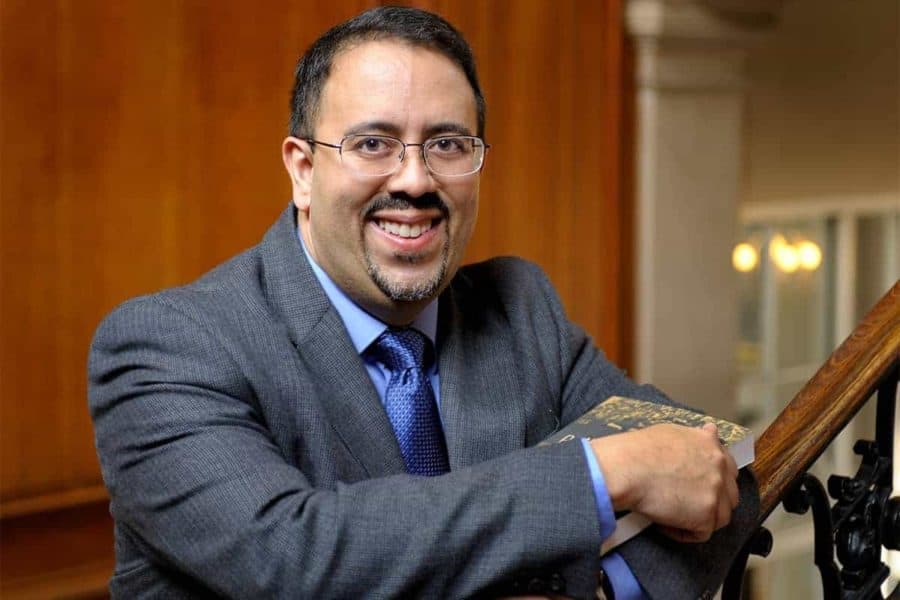There’s nothing new about political protest in sports, but the recent athlete-led game boycotts or strikes following the shooting of Jacob Blake in Kenosha, Wisconsin, seemed to set a new standard. Historian Adrian Burgos Jr. specializes in the history of minority participation in sports as a professor at the University of Illinois, Urbana-Champaign. He’s written extensively on the history of Latinos in professional baseball, including the Negro Leagues, and was the inaugural editor-in-chief of La Vida Baseball. Burgos spoke with News Bureau social sciences editor Craig Chamberlain.
Just how unusual are these player strikes? Is there any precedent?
We are witnessing an unprecedented moment in sports. Many sports historians cite the Olympic Project for Human Rights led by Harry Edwards and its discussion of a boycott by Black athletes of the 1968 Olympics in Mexico City. That effort, however, primarily involved amateur athletes. The boycott did not occur, but the 1968 Olympics are remembered partly for the Black Power salute of John Carlos and Tommy Smith at their medal ceremony.
What makes 2020 different is that these strikes have taken place in professional sports leagues – the NBA, WNBA, MLB and even the NHL. The bold action taken by African American women and their allies in the WNBA is not surprising; they have been at the forefront of using their platform to promote Black Lives Matter, protest police violence toward African Americans and address other social justice issues. Similarly, the NBA is 80% African American, thus the majority of its players are acutely aware of the racial realities of being Black in the United States.
I am surprised, however, that Major League Baseball games were postponed. There is a particular history in MLB that the games must go on. President Franklin Roosevelt granted permission to keep playing during World War II for the positive impact it would have on the morale of the nation.
One moment when Black players refused to play does stand out. Roberto Clemente and his Black teammates on the Pittsburgh Pirates refused to play in the days following the 1968 assassination of Dr. Martin Luther King. Interestingly, the 10 Black players on the Pirates were joined by their white teammates in forcing the postponement of their games in Houston until after King’s funeral. Clemente and a white teammate, Dave Wickersham, even co-wrote a public statement that declared: “We are doing this because we white and Black players respect what Dr. King has done for mankind.”
The act of refusing to play, especially playoff games, seems much more consequential than kneeling during the national anthem, which generated significant controversy just a few years ago. So how much of this is about a changed social climate, and how much about other things?
Refusing to play and causing the postponement of games are much more dramatic actions. Then again, a lot has transpired since Colin Kaepernick first knelt during the national anthem to bring awareness to issues affecting African Americans. There is urgency to the protest actions athletes have taken this season. We are in the midst of a pandemic that has disproportionately affected African American and Latino communities.
Also, the resumption of pro sports during the pandemic has actually made the players’ platform even more prominent. NBA players have been in a “bubble” in Orlando, Florida, since their season restarted. They have been isolated from their families and away from their home communities.
After George Floyd’s death, players took action by using the platform provided by their status as professional athletes. Their recent refusal to play brought the NBA playoffs to a halt, even if just temporarily. More significantly, their actions and their comments during media interviews thereafter expressed their pain and continued frustration about the issue of police violence against African Americans.
Many people want their sports free of politics, and wonder why millionaire players are the instigators of protest. What drives players to take such actions? How do they seek to be viewed beyond their role as athletes?
These recent protests by African American and other professional athletes have taught them – reminded them, perhaps – of the power they possess. That they successfully brought professional games and practices to a halt is significant. It indicates the willingness of Black athletes to use their labor power and their voices to move their leagues to a position more in line with the players’ stance on these issues. Some observers view these actions as players becoming political, that they are mixing sports and politics. I see something else going on in the manner that African Americans have used their voice.
African Americans, no matter how much they earn in sports, do not have the ability to remove their Blackness. Being Black in America is their lived reality. A major part of what New York Mets player Dominic Smith or Los Angeles Clippers coach Doc Rivers are seeking in sharing their experience is for people to literally see their Blackness and their humanity. They want others not just to see a Black athlete or coach whose worth is in the entertainment they provide, but rather to see them as whole beings who are neighbors, family members and fellow Americans.
Editor’s notes:
To reach Adrian Burgos Jr., email [email protected]; Twitter @adburgosjr
Burgos is the author of two previous books on the history of Latinos in baseball, “Playing America’s Game” and “Cuban Star,” and co-author of the upcoming “¡Pleibol! In the Barrios and the Big Leagues.”


